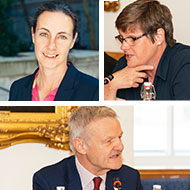
A series of reforms to improve the education and support for veterinary students and new graduates have been approved by RCVS Council.
The approved proposals stem from the 2018 Graduate Outcomes Consultation, launched by the RCVS to garner the views of the profession in four key areas:
- Day One Competences
- The Professional Development Phase (PDP)
- Extra-mural studies (EMS)
- Clinical education for general practice.
Some 3,686 members of the profession and 38 organisations responded to the initial phase of the consultation, which was followed by a series of one-to-one interviews and focus groups.
RCVS director of education, Dr Linda Prescott-Clements, commented: “The consultation concerned a complex series of proposals on some important issues that had been identified in terms of veterinary graduates struggling to adapt to life in practice and how support mechanisms for those graduates might be strengthened – and so we are grateful for the responses and feedback we received from the profession.
“The comments that we received on the proposals for the Day One Competences and Professional Development Phase were clear in largely supporting our proposed direction of travel and, as a result, recommendations and detailed proposals for both of these areas were developed by our Graduate Outcomes Working Group and Education Committee, and have now been approved by Council.
“However, the complexity of workplace learning means that the consensus was less clear on the proposals for EMS and undergraduate clinical education – so the Graduate Outcomes Working Party and the Education Committee has agreed to undertake further work in these areas.”
Day One Competences
The recommendations that came out of the consultation were put to RCVS Council at its meeting on Tuesday (23 January). The proposals approved for Day One Competences include the implementation of a new, conceptual model for the skills and experience of new graduates, including a greater focus on non-clinical competences, such as the need to develop resilience and other professional skills.
RCVS Council also approved the development of specific and detailed guidance on the Day One Competences to support their implementation by veterinary schools. Once developed, this new guidance will need approval from the RCVS Education Committee and RCVS Council and will then be shared with veterinary educators along with a timetable for its implementation.
PDP
Previous research by the RCVS found that whilst the aims of the PDP phase were largely supported, it was viewed as a tick-box exercise and there was a general feeling that support for new graduates needed to be strengthened. The consultation revealed support for a major reform of the PDP, helping students to progress beyond Day One Competences into confident and independent practitioners.
“A completely new programme of support for graduates will be developed,” explained Dr Susan Paterson, chair of the RCVS Education Committee. “This will be centred on the provision of feedback and guided reflection against professional activities which are relevant to their role as identified by the graduate, and supplied by their workplace mentor.
“The RCVS will develop an online training package to support mentors in their roles, and, as a result of feedback from the profession, we will develop a mechanism to accredit practices delivering the new programme, and quality assure it to ensure graduates receive the support they need.”
Vet Futures
Professor Stephen May, chair of the Graduate Outcomes Working Group, added: “We are very pleased that Council has supported the proposals for the Day One Competences and PDP, and the direction of travel for EMS and clinical education. We are very grateful to those who took the time to provide their ideas and feedback on improving the support for veterinary students and new graduates.
“The Vet Futures research made it clear that there were difficulties and anxieties in terms of the transition to life in practice, including problems with mental ill-health and poor wellbeing, leading to some graduates leaving the profession. We owe it to our newest veterinary surgeons to find better ways of preparing them for the complexity of clinical practice, and primary care in particular, as well as supporting them through the early stages of their careers and ensuring that they are ready for what awaits them.”



 The latest
The latest